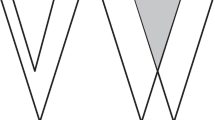Abstract
Mathematical concepts play at least three roles in the application of mathematics: an inferential role, a representational role, and an expressive role. In this paper, I argue that, despite what has often been alleged, platonists do not fully accommodate these features of the application of mathematics. At best, platonism provides partial ways of handling the issues. I then sketch an alternative, anti-realist account of the application of mathematics, and argue that this account manages to accommodate these features of the application process. In this way, a better account of mathematical applications is, in principle, available.
Similar content being viewed by others
Notes
Of course, mathematical theories also need to meet additional constraints, such as being informative and mathematically tractable. A true but uninformative mathematical theory won’t be of much use. Similarly, a mathematical theory that is so computationally intractable that hardly any results can be derived from it will not offer significant gains—even if it were true. But these constraints may be taken to be mostly pragmatic.
In some cases, the representational and the expressive roles can, of course, overlap. For example, when we measure the temperature of a gas under pressure, we seem to be representing the temperature by using certain numbers as a proxy for a physical property. But we also seem to be expressing a claim about the temperature of the gas. (Thanks to Russell Marcus for raising this point.) What is important here is the function played by each usage: we establish a certain mathematical representation in order to express a particular claim about the temperature of the gas.
Azzouni (2004) distinguishes quantifier commitment and ontological commitment, but refuses to adopt an agnostic interpretation. Thus, he does not seem to be in a position to claim that when we quantify over certain objects, we quantify over something, even though it might be something that does not exist (for further discussion, see Bueno and Zalta 2005; Azzouni 2009, 2010; Bueno 2013). The approach suggested here does not face this difficulty, since it allows one to talk about properties of nonexistent objects. We may quantify over certain objects, but this is not enough to claim that these objects exist: an existence predicate also needs to be met (Zalta 2000; Bueno and Zalta 2005).
References
Azzouni, J. (1994). Metaphysical myths, mathematical practice: The logic and epistemology of the exact sciences. Cambridge: Cambridge University Press.
Azzouni, J. (2004). Deflating existential consequence: A case for nominalism. New York: Oxford University Press.
Azzouni, J. (2009). Empty de re attitudes about numbers. Philosophia Mathematica, 17, 163–188.
Azzouni, J. (2010). Talking about nothing: Numbers, hallucinations, and fictions. New York: Oxford University Press.
Bueno, O. (2005). Dirac and the dispensability of mathematics. Studies in History and Philosophy of Modern Physics, 36, 465–490.
Bueno, O. (2011). When physics and biology meet: The nanoscale case. Studies in History and Philosophy of Biological and Biomedical Sciences, 42, 180–189.
Bueno, O. (2013). Nominalism in the philosophy of mathematics. In E. N. Zalta (Ed.), Stanford encyclopedia of philosophy (Fall 2013 edition). http://plato.stanford.edu/archives/fall2013/entries/nominalism-mathematics/
Bueno, O., & French, S. (2012). Can mathematics explain physical phenomena? British Journal for the Philosophy of Science, 63, 85–113.
Bueno, O., & Shalkowski, S. (2013). Logical constants: A modalist approach. Noûs, 47, 1–24.
Bueno, O., & Shalkowski, S. (2015). Modalism and theoretical virtues: Toward an epistemology of modality. Philosophical Studies, 172, 671–689.
Bueno, O., & Zalta, E. (2005). A nominalist’s dilemma and its solution. Philosophia Mathematica, 13, 294–307.
Colyvan, M. (2001). The indispensability of mathematics. New York: Oxford University Press.
Dirac, P. (1958). The principles of quantum mechanics. Oxford: Clarendon Press.
Field, H. (1980). Science without numbers: A defense of nominalism. Princeton, NJ: Princeton University Press.
Field, H. (1989). Realism, mathematics and modality. Oxford: Basil Blackwell.
Hellman, G. (1989). Mathematics without numbers: Towards a modal-structural interpretation. Oxford: Clarendon Press.
Hellman, G. (1996). Structuralism without structures. Philosophia Mathematica, 4, 100–123.
Lewis, D. (1980). Veridical hallucination and prosthetic vision. Australasian Journal of Philosophy, 58, 239–249.
Putnam, H. (1971). Philosophy of logic. New York: Harper and Row.
Quine, W. V. (1960). Word and object. Cambridge, MA: The MIT Press.
Rédei, M. (1997). Why John von Neumann did not like the Hilbert space formalism of quantum mechanics (and what he liked instead). Studies in History and Philosophy of Modern Physics, 28, 493–510.
van Fraassen, B. C. (1991). Quantum mechanics: An empiricist view. Oxford: Clarendon Press.
von Neumann, J. (1932). Mathematical foundations of quantum mechanics. Princeton: Princeton University Press.
Weyl, H. (1931). The theory of groups and quantum mechanics. New York: Dover.
Wigner, E. P. (1931). Group theory and its application to the quantum mechanics of atomic spectra. New York: Academic Press.
Zalta, E. (2000). Neologicism? An ontological reduction of mathematics to metaphysics. Erkenntnis, 53, 219–265.
Acknowledgments
My thanks go to Jody Azzouni, Newton da Costa, Steven French, Russell Marcus, and Ed Zalta for extremely helpful discussions.
Author information
Authors and Affiliations
Corresponding author
Rights and permissions
About this article
Cite this article
Bueno, O. An anti-realist account of the application of mathematics. Philos Stud 173, 2591–2604 (2016). https://doi.org/10.1007/s11098-016-0670-y
Published:
Issue Date:
DOI: https://doi.org/10.1007/s11098-016-0670-y




